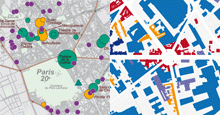
Every year the Apur gathers huge quantities of information, either in return for payment or free of charge. It is organised, as much as is possible, into localised databases, integrating links with one or more geographic identities such as an address, or street block or land plot number. Among the data collected one can find for example:
- Housing, business premises, buildings, plots of land and their owners (found in files on built on and non built on land at the Head Office of Public Finance – DGFIP).
- The general population censuses (from 1954 to 2006) within communes, street blocks and IRIS defined groups of street blocks (socio-demographic indicators created by National Institute for Statistics and Economic Studies -INSEE).
- Regulations for protecting historical monuments laid down by the the City of Paris Department of Urban Planning, records of plots of land, Information on urban planning law -renseignements d'urbanisme-.
- Employment assessed at a street block level, based on the regional employment survey and on specific work on localising public service jobs. This task was resumed in 2007 in the context of an agreement with the National Institute for Statistics and Economic Studies – INSEE using its information system on local productivity – CLAP.
- Data of the French Social Security and Child Benefit Office – CAF.
The Apur also creates data such as:
- The database on Parisian trade resulting from an exhaustive survey in the field, with three successive versions in 2001, 2003 and 2005.
- Public facility premises and detailed data reference points of the addresses of facilities in Paris and the three Departments of the inner suburbs (bringing together information supplied by departments of the City of Paris, communes of the inner ring of suburbs, and diverse other sources (web sites, municipal guides).
- Details of buildings under the same plot address and construction dates (in Paris only).
- The file on hotels.
The Apur collaborates with numerous departments of the Paris City Council and the State thus having access to data potentially.
